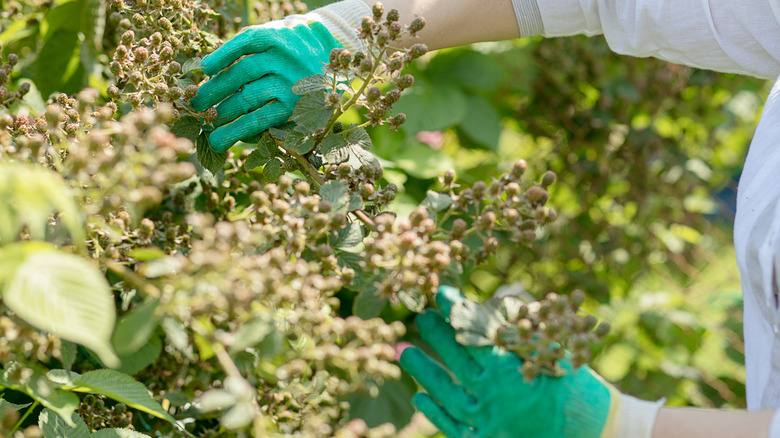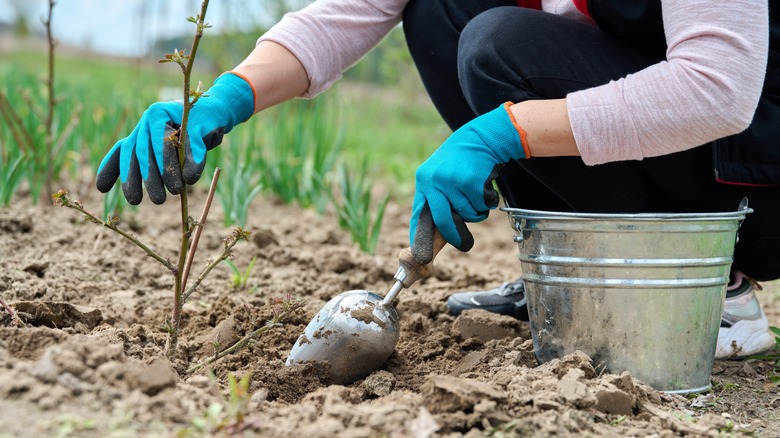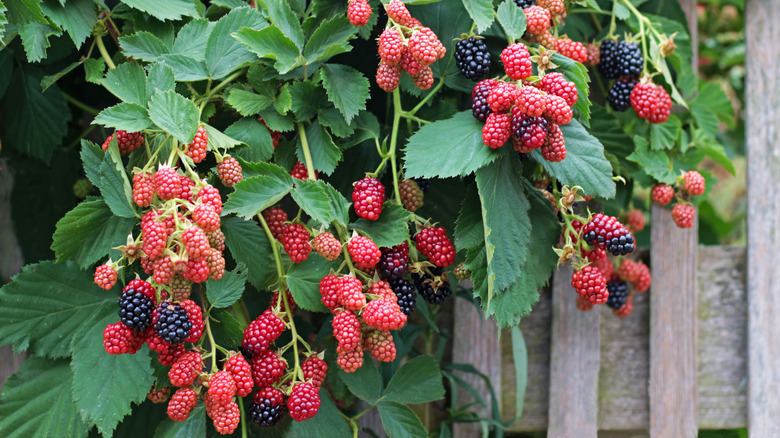Avoidable Errors That'll Save Your Blackberries In The Garden
Although blackberries are a familiar fruity treat, these delectable jewels of the garden not only make for a delightful and nutritious snack but are also a rewarding addition to any landscape. With their sweet-tart flavor, high nutritional value, and versatility in culinary use, it's no wonder many gardeners are eager to cultivate their own blackberry bushes. However, amidst the excitement, several common mistakes can hinder the successful growth and production of these beloved berries. Some of the most prevalent blunders include improper site selection, neglecting soil preparation, inadequate pruning, insufficient support, and neglecting pest and disease management. These errors often stem from a lack of understanding of the blackberry's specific needs and requirements, leading to frustration and disappointment among growers.
Belonging to the Rubus genus of the Rosaceae family, blackberries are a diverse group of perennial shrubs native to Europe, North America, and parts of Asia and South America. They have been cherished for centuries, with evidence of their consumption dating back to prehistoric times. In addition to their culinary appeal, blackberries have a rich cultural and medicinal history. Native American tribes utilized various parts of the blackberry plant for food, dye, and traditional medicine. If you're looking to add blackberries to your yard or garden, you'll want to avoid the common errors mentioned above to grow healthy, resilient plants, and enjoy abundant harvests.
Solutions to common mistakes
To ensure thriving blackberry bushes, avoid planting them in a location with insufficient sunlight and in poorly drained soil that can lead to root rot and stunted growth. Start by selecting a suitable site with full sun exposure and well-drained soil. Conduct a soil test to determine pH (6.0-7.0 is ideal for blackberries) and nutrient levels, amending as necessary to achieve the ideal conditions. Prior to planting, clear the area of weeds and debris, and incorporate organic matter to improve soil structure and fertility. And since blackberries tend to spread, make sure there's ample space for them to do so without affecting other plants in your garden or yard.
Neglecting to prune blackberry plants can result in overcrowded growth, reduced air circulation, and decreased fruit production. Without proper pruning, plants may become tangled and susceptible to disease. Prune blackberry plants annually from late fall to early spring, removing dead or diseased canes and thinning out overcrowded growth. This aids in the development of new shoots and better fruit production.
Blackberry canes can become heavy with fruit, causing them to bend or break without adequate support. Failing to provide proper support can lead to sprawling growth and decreased yields. Install trellises, fences, wire, or other types of support to provide stability for blackberry canes. Training canes to grow upward improves air circulation, reduces disease pressure, and makes harvesting easier.
Pest management for thriving blackberries
Ignoring pests and diseases can result in diminished plant health. Common pests such as aphids, spider mites, and fungal diseases like powdery mildew can wreak havoc on blackberry plants if left unchecked. Besides proper pruning, implement an integrated pest management approach, including biological and cultural solutions to minimize your reliance on chemical pesticides.
Start by encouraging populations of beneficial insects, such as ladybugs, lacewings, and predatory mites, which feed on common blackberry pests. Introduce parasitic wasps, which attack aphids by laying eggs inside them. These tiny wasps are highly effective at controlling aphid populations without harming beneficial insects or damaging blackberry plants. Growing various plants (e.g., cilantro, dill, cosmos, conflowers, alfalfa, sweet alyssum, verbena, etc.) throughout your garden provides habitat and food sources for these helpful predators.
Inspect your plants regularly and maintain good garden hygiene by removing fallen leaves and fruit, and pruning debris from around blackberry bushes. Pests and diseases can overwinter in your garden, so keeping the area clean minimizes their opportunities for survival and reduces the risk of infestation in the following season. Rotate blackberry plants with unrelated crops to disrupt pest life cycles and reduce the buildup of soil-borne pathogens. Furthermore, avoid planting blackberries in the same location year after year to prevent the accumulation of pest populations and disease pressure. During spring, apply a layer of organic mulch (preferably straw or woodchips) around the base of blackberry plants to suppress weeds, conserve moisture, and improve soil structure.


